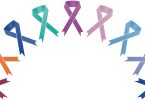Cancer nurse navigators are an important link between patients and UHS doctors, staff and services. UHS navigators are experienced oncology nurses who guide patients through care choices, help to manage appointments and connect patients with any additional support they may need, all with the goal of providing the best outcomes.
Helping patients thrive
Feedback from patients and a careful study of best practices have helped UHS create a robust cancer support program. The following are just some of the support services offered:
Financial advocacy: Financial concerns should not derail a patient’s chances for the best possible health outcome. Financial advocates provide practical help with insurance and connect cancer patients to low-cost or free services and grants.
Oncology social workers: The area’s only dedicated oncology social workers help connect patients with any services needed to complement individual treatment plans.
Cancer rehabilitation: Physical, occupational and speech-language therapy can help restore energy, strength, mobility and everyday capabilities.
Lymphedema therapy: Patients who have had lymph nodes removed may receive specialized massage therapy and learn techniques to lessen swelling and maintain mobility in the affected limb.
Nutrition therapy: Maintaining a healthy weight and energy level is crucial for cancer patients’ well-being. Dedicated nutritionists assist with information about proper nutrition and supplements.
Free transportation: Free rides to and from appointments are available through volunteers and local organizations.
Tobacco cessation support: Personalized counseling helps tailor a tobacco cessation program to individual needs.
UHS Home Care: An array of in-home services is available to the approximately 90 percent of cancer patients who receive outpatient cancer care. Services include infusion, skilled nursing, maintenance of medical supplies and equipment, and rehabilitation therapies.
“A new diagnosis can be overwhelming,” says Mary Mancini, BSN, RN, one of three experienced UHS oncology nurse navigators. “We can help you to quiet the mind, understand your diagnosis and manage your care coordination concerns. We can advocate for you and act as your voice when you can’t find it in you.”
Patients can request nurse navigation assistance or be referred by a UHS cancer care team member at any time during their journey from care through survivorship. A navigator may join patients during doctors’ appointments, check in with patients during chemotherapy or radiation treatments, and explain what to expect at any point in the treatment and recovery process.
Ms. Mancini often refers patients and their family members to helpful UHS support services when she recognizes a problem arising.
Cancer patients have a complex series of appointments, including imaging, genetic counseling and oncology. Nurse navigator Melissa Gaska, RN, OCN, CBPN-IC, has found practical solutions can make a big difference in how well a patient copes. Everyone on the oncology team keeps an eye out for signs that a patient or family member is struggling in any way and could use more help, she says. “We work together to coordinate care and the level of patient support is amazing.”
When treatment ends, the oncology nurse navigators can make referrals to a variety of survivorship services and therapies, and may check in months later if the patient and family wish. All of the UHS navigators enjoy being with their patients.
“We’re here to make a difficult journey a little easier,” says Ms. Mancini.
GET SUPPORT
Learn more about the variety of support groups UHS offers, including groups tailored to men, women, children, caregivers, and people with specific cancers.







